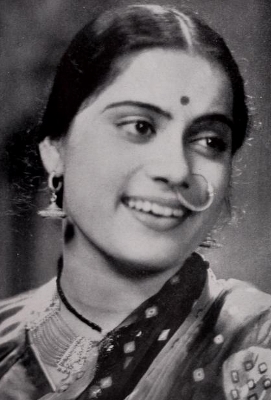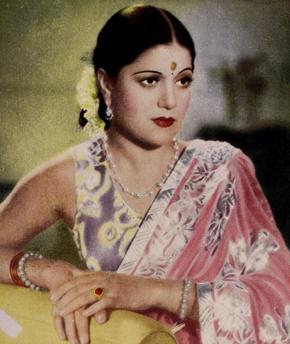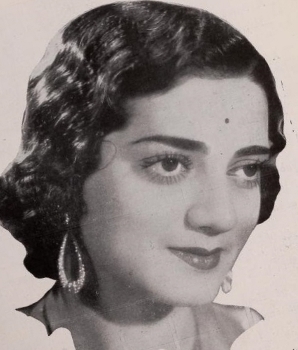
Pramathesh Chandra Barua was an Indian actor, director, and screenwriter of Indian films in the pre-independence era, born in Gauripur, Dhubri, Assam.

Ghar Ki Izzat is a 1948 Hindi drama film directed by Ram Daryani for Murli Movietone. The film starred Dilip Kumar and Mumtaz Shanti in lead roles with Manorama, Jeevan and Gope. The cinematography was by Kumar Jayawant. Music was composed by Pundit Gobindram. The story writer was K. S. Daryani and the dialogue and lyrics were by I. C. Kapoor.
Anandalok Puraskar or Anandalok Awards ceremony is an award ceremony for Bengali film in India. The Anandalok, only film magazine in Bengali language, published from Ananda Publishers and Ananda Bazar Patrika presents this award (Puraskar). The magazine was started on 25 January 1975 and the awards ceremony was started in 1998.

Zindagi is a 1940 Indian film, directed by Pramathesh Barua and produced by Birendranath Sircar. Starring K. L. Saigal, Jamuna Barua, Pahari Sanyal, Shyam Laha, Sitara Devi, and Nemo, it revolves around Ratan, an unemployed university graduate, and his relationship with Shrimati, who is on the run from her cruel husband.

Sneh Bandhan also called Intezar, is a social melodrama Bollywood film. It was released in 1940. The film was a maiden production from producer Kikubhai Desai's new banner; Great India Pictures. Previously known to produce crime thrillers and fantasy, this was Desai's first social genre film. The music was by Pannalal Ghosh, with lyrics written by Pandit Betaab. The cast included Bibbo, E. Billimoria, Navin Yagnik, Pratima Devi and Muzammil.
Rambaan is a 1948 Indian Hindi-language mythological drama film directed and produced by Vijay Bhatt and written by Mohanlal Dave, with dialogue by Pandit Girish. The film starred Prem Adib as Rama and Shobhana Samarth as Sita, with Chandra Mohan, Umakant, Amirbai Karnataki and Raj Adib in other principal characters. The film's music was composed by Shankar Rao Vyas.

Ladki Sahyadri Ki is a 1966 Hindi social drama film directed by V. Shantaram. Also called Iye Marathichiye Nagari in Marathi, it was a bilingual for V. Shantaram productions under the Rajkamal Kalamandir banner. The music was composed by Vasant Desai, with lyrics by Bharat Vyas. The cast included Sandhya, Shalini Abhyankar, Vatsala Deshmukh, Kumar Dighe, Keshavrao Date, and Baburao Pendharkar.

Manoos, also called Life's for Living, is a 1939 Indian Marathi social melodrama film directed by V. Shantaram. The movie was simultaneously made in Hindi as Aadmi. The film was based on a short story called "The Police Constable". The story was by A. Bhaskarrao, with screenplay and dialogue by Anant Kanekar. The cinematographer was V. Avadhoot and the music was composed by Master Krishna Rao, with lyrics by Kanekar. The cast included Shahu Modak, Shanta Hublikar, Sundara Bai, Ram Marathe, Narmada, Ganpatrao and Raja Paranjpe.

Dui Purush is a 1945 Bengali language epic family drama film directed by Subodh Mitra. Produced by New Theatres and adapted from Tarashankar Bandyopadhyay's novel and popular stage play, with a screenplay by Binoy Chatterjee. The editing was done by Mitra, who was popularly known as Kachi Babu, and cited as one of the best editors in the film industry. The music director was Pankaj Mullick with lyrics by Sailen Roy. The cinematographers were Sudhin Majumdar and Yusuf Mulji. The cast included Chhabi Biswas, Chandrabati Devi, Sunanda Banerjee, Ahindra Choudhury, Tulsi Chakraborty, Jahar Ganguly, and Naresh Mitra.

Shanta Apte (1916–1964) was an Indian actress-singer who worked in Marathi and Hindi cinema. Renowned for her roles in films like Duniya Na Mane/Kunku (1937) and Amar Jyoti (1936) under the Prabhat Films banner, she was active in Indian cinema from 1932 to 1958. Apte's impact on Marathi cinema "paralleled" that of Kanan Devi in Bengali cinema. Along with Kanan Devi, Apte is cited as one of the "great singing stars" from before the playback singing era. Apte began her career in films playing the role of a young Radha in the Marathi film Shyamsunder (1932). She joined Prabhat Films acting in her first Hindi language film Amrit Manthan in (1934).

Sardar Akhtar (1915–1986) was an Indian actress who worked in Hindi and Urdu films. She started her acting career on the Urdu stage. Her early films were with Saroj Movietone, where she did a majority of stunt (action) roles. She came into prominence as the washer-woman in the role of Rami Dhoban in Sohrab Modi's Pukar (1939). As a woman seeking justice for the death of her husband, it was a breakthrough role for her. A popular song she sang in the film was "Kaheko Mohe Chhede". Her career defining role was as a "peasant woman" deserted by her husband, in Mehboob Khan's Aurat (1940), a role later made famous by Nargis in Mehboob's remake Mother India.

Nartaki (Dancer) is a 1940 film directed by Debaki Bose for New Theatres Ltd, Calcutta. A bilingual made in Hindi and in Bengali, it had story and screenplay written by Bose, with cinematography by Yusuf Mulji. Music was composed by Pankaj Mullick. The cast had actress Leela Desai playing the title role of Nartaki. Najam also called Najam-Ul-Hasain or Najmul Hussain had left Bombay Talkies following his affair and elopement with Devika Rani, had now joined New Theatres Ltd, where he was cast in films like Anath Ashram (1937), Dushman (1939), Kapal Kundala (1939), and Nartaki. The rest of the main cast included Jagdish Sethi, Wasti and Pankaj Mullick in the Hindi version.
Abhagin is a 1938 Hindi film directed by Prafulla Roy for New Theatres Ltd., Calcutta. A bilingual, it was made in Bengali language as Abhigyan. The film was based on a story by Upendranath Ganguly, with dialogues by A. H. Shore. R. C. Boral provided the music composition with lyrics for the Hindi version by Munshi Arzu, and by Ajoy Bhattacharya for the Bengali. The screenplay was by Phani Majumdar for whom it was his first independent film as a scriptwriter. Bimal Roy, who was to make a name for himself as a prominent Bengali and Hindi director, was the cinematographer for the film. The cast included Molina Devi, Prithviraj Kapoor, Vijay Kumar, Nemo and Bikram Kapoor.

Bibbo was a music composer, singer and actress who worked in both Indian and Pakistani films. She acted in Indian cinema from 1931 to 1947 before moving to Pakistan, following Partition of India in 1947. She started her acting career with Ajanta Cinetone Ltd. in 1933, working with directors like M. D. Bhavnani and A. P. Kapoor. She was one of the top leading ladies of the 1930s along with actresses like Devika Rani, Durga Khote, Sulochana, Mehtab, Shanta Apte, Sabita Devi, Leela Desai and Naseem Banu. She was referred to as "one of the most important female stars of the 1930s and 1940s". Her fame had her featured in the lyrics of a popular song from the film Gharib Ke Lal (1939) sung by Mirza Musharraf and Kamla Karnataki, with music by Sagheer Asif and lyrics by Rafi Kashmiri. "Tujhe Bibbo Kahoon Ke Sulochana", where Sulochana referred to another popular actress of the time. This was the first time a song featuring famous actors was used in the lyrics of a film song.

Sabita Devi (1914–1965) was a Hindi film actress in Indian cinema. She is stated to be one of the "prominent" leading ladies of the "pioneering era" of Indian cinema along with Mehtab, Bibbo, Durga Khote, Gohar, Devika Rani and Seeta Devi. A Jewish by birth, she changed her name to find acceptability in Hindi cinema like the other Anglo-Indian and Jewish actresses of her time, Sulochana, Seeta Devi, Madhuri, and Manorama. After initially working with British Dominion Films Ltd., Calcutta, she shifted to Bombay and performed mainly in films produced by Sagar Movietone with her co-star in most films being Motilal. Some of the popular films with Motilal were Dr. Madhurika (1935) and Kulvadhu (1937) directed by Sarvottam Badami. Their first film together was Shaher Ka Jadoo (1934), which was also Motilal's debut film, and then Lagna Bandhan (1936) both directed by Kaliprasad Ghosh. She acted in Silver King (1935) with Motilal. It was an action film directed by C. M. Luhar, which became a "huge success".

Mukti is a 1937 Indian Hindi and Bengali-language drama film, directed by Pramathesh Barua and produced by New Theatres.

Mazhar Khan was an actor, producer, and director in Indian Cinema. He started his career as a police officer, which he left to study law for a short period. After abandoning his studies, he came to Bombay and started his career in cinema with the silent film Fatal Garland (1928) opposite the top actress of the time, Ermeline. He became a popular actor, gaining success in several silent films. During his stint in silent films he worked with well-established directors such as Bhagwati Prasad Mishra, Ezra Mir, Moti P. Bhagnani, R. S. Chowdhary, and M. D. Bhavnani. Magazines in the 1940s compared Khan to Hollywood actors such as Paul Muni, Bela Lugosi and Boris Karloff.

Sushila Rani Patel (1918–2014) was an Indian classical singer, actress, vocalist, doctor, and journalist. She established Shiv Sangeetanjali, a school for classical music.















